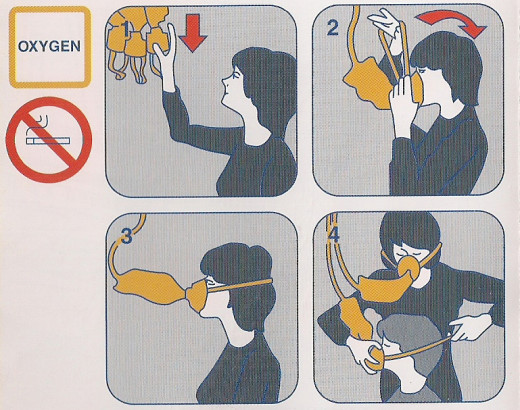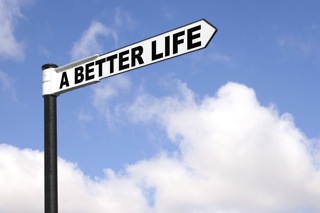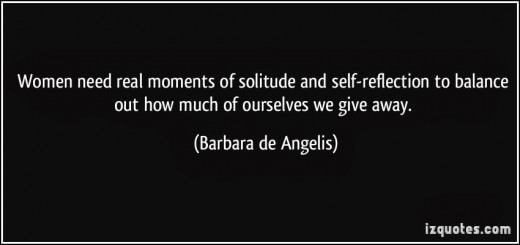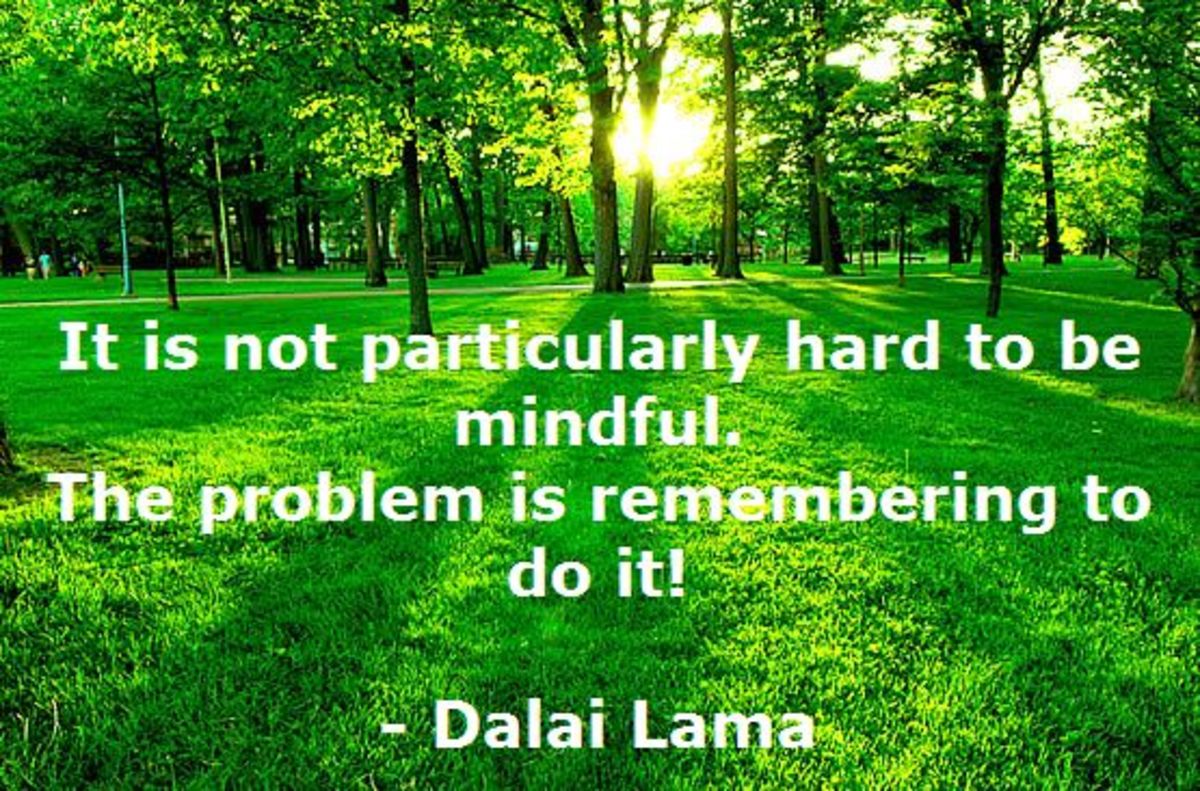- HubPages»
- Health»
- Personal Health Information & Self-Help»
- Mentally & Emotionally Balanced Living
Selfish Brat or Self-Care?
"That's Just Selfish!"
I spent about 20 years as a caregiver. The last 7 or so were intense. I had to sacrifice nearly everything -- time with my kids, my hobbies, my life's work, my financial security, my friendships, and my peace of mind.
When it was finally over, when I had a chance to regroup, I said to a friend, I'll call her Abigail, over lunch, "I'm going to focus on myself and my kids now -- what we need. That's it. I'm not going to get sucked into anyone else's problems."
Abigail gave me an appalled look over our tacos. "That's just . . . selfish!"
Ahhh . . . . yes. I understood and understand why she said that. She and I had always followed the same creed: If someone needed us, we were there. If someone needed something we had, we gave it. If we were tired, used up, washed out and someone needed us, we gathered the strength from somewhere and delivered.
I was about to break all the rules. I was about to be selfish.
John A Johnson, Ph,D., writing on psychologytoday.com addresses this issue in his article: Good, Neutral and Bad Selfishness. He writes that selfishness is bad for others and good for you. Selfless sacrifice is bad for you but good for others, But he suggests that there is a third option, where everyone benefits and no one gets hurt.
You Can't Help if You Can't Breathe
I've heard it on the radio, from the pulpit, from a counselor, and in books, but it's a great metaphor so I'm using it anyway. Flight attendants always tell airline passengers that in the event of an emergency, able adults should put their own oxygen masks before helping children and disabled people put on theirs. Why? Because if the able adults can't function, they can't care for the vulnerable.
By the time I had this conversation with Abigail, I was well and truly oxygen-deprived. I had nothing else to give anyone, and I knew it. I had nothing left. Abigail was in the same boat -- she had armies of relatives sucking out every resource she had. We had both spent our lives care-giving, and anytime one need subsided, others rushed in to fill the void.
Putting on that oxygen mask was counter to everything I'd ever done or known.
Abigail wasn't the only one who disapproved. While I'd been caring for one person, others had sat back resentfully, thinking about what I should have been doing for them. As far as they were concerned, it was their turn. I had so little fight in me, but somehow I held the line.
I slept. I painted. I read. I walked. I hung up the phone to end rants. I literally moved to remove myself from the expectations of others. I breathed.
Greedy for Air

If You Don't Breathe, You Die
People can last maybe ten minutes without oxygen, so our metaphor can only take us so far. Had I fallen back into the old patterns, I wouldn't have died. At least not immediately.
Bluntly, Abigail's choice to continue will ultimately kill her. She had manageable health problems, but she was so used up by others that she didn't manage them. Now they are life-threatening health-problems, but they probably don't even rank in the top ten of her daily priority list.
The people who depend on Abigail have legitimate needs. Everyone has legitimate needs, and people need to take care of each other. But in spite of what your mother, your religion or your society may have taught you, you are one of the "everyone" who has legitimate needs.
What if you took some of that energy, time, money and inner strength that you invest in others, and you invested it in yourself? What would you be capable of? What would your life look like?
Melody Beattie writes in Codependent No More (1987), "We need to love ourselves and make a commitment to ourselves. We need to give ourselves some of the boundless loyalty that so many codependents are willing to give others. Out of high self-esteem will come true acts of kindness and charity, not selfishness. The love we give and receive will be enhanced by the love we give ourselves."
Are YOU Still In Your List of Priorities?
Do you have a dream for your life? Are you making any progress toward it?

The Perfect Balance Between Self-Care and Selfishness
How do you find the perfect balance between self-care and selfishness?
You don't.
There's no mathematical equation, no checklist or roadmap you can use to make sure you're on the right track. Humans are messy, disorganized creatures. There will be times when you won't find the balance because the balance doesn't exist -- the needs on all sides are too compelling. But here are some guidelines to follow:
- A crisis is a temporary condition. If you are in crisis mode for months or years, it's not a crisis -- it's a way of life. Take the time to really scrutinize your situation. Often we attribute situations to God or fate or "just the way it is", when really we're in the situation because we haven't taken measures to change it yet.
- Are you helping or enabling? This is such a tough question. Our parents, siblings or kids may have been counting on us for years, but unless they are severely disabled with no other options, their sense of responsibility for their lives should be at least as great as yours. Your adult son may be outraged at your "betrayal" when you refuse to take his kids on your day off, but he is a man. He is just as capable of finding a babysitter as you were when you were his age.
- Question yourself. Then question yourself again. Try to look at your life from a distance. Try to imagine what you'd tell a friend in the same circumstances.
- You are not Jesus Christ. I actually had a counselor tell me that once. I explained to her that I wanted a car, wanted to go to college, wanted some new clothes . . . but I had to give my brother money every month for a pursuit of his. My counselor barked at me that Jesus had already given His life for everyone -- I wasn't required to do the same!
- Be prepared for backlash. Oh, honey . . . be prepared for backlash. And outrage. And guilt trips. And biting criticism. If you have spent your adult life serving the needs of others, they will fiercely resist your efforts to take care of your own needs. Some of them will eventually get over it, and come to treat you with more respect. Some of them will never get over it. That will be hard and painful, but still better than a life of subjugating all of your own needs.
This Applies To Everyone. Including you
Example: Balancing a Week
Others' Needs
| My Needs
| |
|---|---|---|
Sunday
| Drive Mama to church
| Instead of staying, take walk in nearby park
|
Monday
| Babysit Jenna's kids
| Give her warning, max once a week from now on
|
Tuesday
| Kate will probably come by to hang out
| Visit for an hour, but then be honest that this is my time to write
|
Wednesday
| Take Mama to store
| Set alarm on my phone, we HAVE to be done by six or I'll be late to class again.
|
It's all about being intentional -- make decisions instead of reacting.

Claim Your Life
As you work to balance your own needs with those of others, you will never satisfy everyone. You may not even satisfy yourself entirely. But if you stay mindful and make intentional choices, you'll walk the uneven path and meet everyone's needs (including your own) imperfectly -- but well enough.








